Genre: RPG Developer: Namco Publisher: Namco Players: 1 Released: 1991
Usually, I would admit that I’m loathe to review anything based on anime. I simply cannot identify with the 300 episode-long, girl-oriented, saccharine-sweet identity the industry has adopted recently, and I prefer to reserve my tastes to the single film epics of the ’80s and ’90s. I avoid just about everything related to modern anime, and while I entirely understand and respect those who enjoy it, it just isn’t my thing. I guess I’m starting to reach that age when things on my lawn begin to bother me.
I suppose that is why I was so happy to have the chance to review Namco’s Fushigi no Umi no Nadia (henceforth referred to by its western name, Nadia: Secret of Blue Water), which is based on the kind of anime I enjoy. An odd sort of RPG, Nadia follows the same plot as the ADV series that was originally broadcast in Japan from 1990-91. The Anime Network aired it briefly, but the Internet is most likely the easiest way to view it today.
Nadia tells a complicated tale of a young girl who is being pursued by a trio of jewel thieves out to take her special pendant. An item of immense sentimental value, Nadia’s Blue Water gem quickly becomes the centerpiece of a worldwide battle between good and evil. A young mechanic named Jean, searching for his long lost father, saves Nadia from the thieves, and together they find themselves embroiled in war against Neo-Atlantis, an organization out to rule the world. The duo ally themselves with Captain Nemo (yes, that Captain Nemo) and eventually even their former thieving foes for the sake of the greater good, and their adventures take them across the planet. Those unfamiliar with the show will find the game to be a wonderful way to get acquainted with such a deep and moving story. Taking elements of Jules Verne and meshing it together with lessons against the evils of colonization and oppression, the game casts players as Jean, who must use his wit and mechanical prowess to help Nadia and Nemo stop Neo-Atlantis from achieving world domination.
Unlike other RPGs of the time, Nadia contains no combat. The entire game consists of exploring and solving puzzles, and the story is the central star. It is very close to the anime’s plot, so fans of the series will most likely always be one step ahead of things. There are many environments to explore, both above and below the sea, and using the multiple items Jean and his party find serve mostly to advance the story and cement the relationships between the main character than anything else. There is no leveling up, no weapons and equipment to purchase, and there is no fighting random monsters for gold and experience. Again, this complete elimination of most of the basic tenets of the genre is done for the sake of storytelling, but it will definitely take RPG enthusiasts (especially those unfamiliar with the show) some getting used to. It doesn’t even support a save feature natively (not counting save states if played through an emulator), and instead passwords are provided at the end of each chapter.
If there’s a downside for this unique focus, it’s that much of the gameplay that makes an RPG what it is must be substituted, otherwise what’s left is a motion comic. Unfortunately, most of what’s there consists of fetch quests and tracking down people for conversation, and it can often become tedious to have to return to a location several times to find an item or that one NPC who can progress the story with a single text bubble. Not knowing where to go can mean lots of backtracking and aimless wandering, and while the new English translation makes the game much less daunting in this regard, it does little to make it more enjoyable. In truth, Nadia actually has more in common with titles like Snatcher and Scooby-Doo Mystery than games like Phantasy Star in that it’s so far removed from typical RPGs in its gameplay. The refreshing part about this departure is that Nadia doesn’t actually play like a graphic adventure, and the developers have essentially wrapped the gameplay of one genre inside the style of another, creating something not really equaled on the Genesis.
Speaking of the translation, it’s excellent. Eien Ni Hen’s text is clean and error-free, and it’s quite easy to read. My only complaint is the use of different colors to differentiate who is speaking. I would have preferred that those involved be named, and this is yet another element that requires a level of adjustment on the part of the player. It was a very pleasant surprise to see such an obscure Japanese title chosen for translation, and I am most happy to see that the Genesis translation scene is alive and well. This is rumored to be one of several titles that will be getting such treatment during 2011, and efforts have already been made to put Nadia on cartridge as a reproduction, which means that those who want to play this great game in English and on their actual hardware may do so. It will cost a bit, but a labeled cartridge with full-color insert would look quite nice on one’s shelf.
Overall, there is nothing inherently wrong with Nadia. It’s a marked departure from other RPGs on the console, and its style of play might not be for everyone. Those looking for combat and the massive towns and exploration that are such a staple of these games are going to probably pass this one over, and that is their loss. Nadia is fresh and engaging, and if one can look past the sometimes cloudy objectives, it offers a great experience for those wanting to try something new. It’s a true shame that it took so long to finally become playable outside of Japan, but late is most certainly better than never. Its quality is also a great testament to the quality of the series on which it’s based. Finding a patched copy of the game shouldn’t be too hard for those interested, so go and find one! Nadia needs your help!
SCORE: 7 out of 10


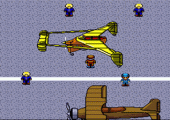
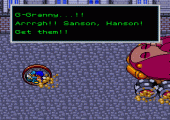
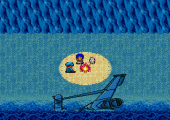
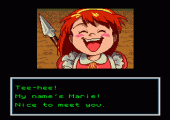
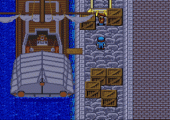
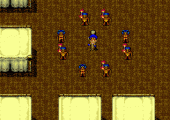
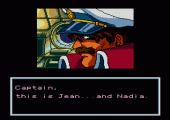
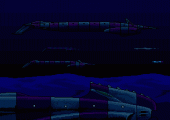
Recent Comments